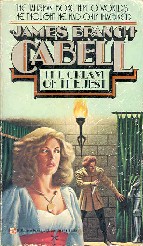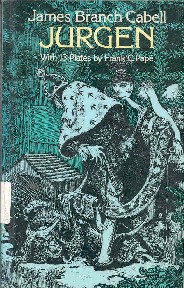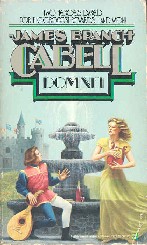James Branch Cabell
Best known for his fantasy satire Jurgen, Cabell was a prolific novelist who (among other things) wrote an enormous cycle of books set in his medieval fantasy land of Poictesme, supposedly somewhere in southern France.
He was possibly the first American to tackle the genre of high fantasy, and his writing is very different from that of British pioneers like Dunsany and William Morris, much less serious and yet more eggheaded in its supposedly endless wordplay (which I never seem to get), tongue in cheek humor, bizarre plot developments, and weird self-referentiality.
By the 1930s his popularity was waning, and today he's obscure, although he's been cited as an influence on several authors, including Heinlein.
The only cheap, widely available editions of his fantasy novels are six books in the Ballantine Adult Fantasy series, plus versions of Jurgen published by several companies.
For now, I'm going to stick to reviewing those.
|
 The Cream Of The Jest (1917) The Cream Of The Jest (1917)
Wow, you've got to give this guy credit for his utter audacity.
A post-modern novel way, way before other fantasy writers dared to be so experimental, this is a self-referential, story-within-a-story yarn about a middle-aged, well-to-do suburban house husband who disappears nightly into random moments of history, accompanied by his platonic lover Etarre, a literal and figurative stand-in for all the unattainable women who ever existed.
Or is it all a figment of his imagination?
Clever, clever, clever.
Um, okay, so there's one little problem.
It's terrible.
The hero is so drab and self-involved you can't bear to hang out with him, Etarre is so abstract she's completely uninteresting, and their adventures are so truncated, arbitrary, and humorless they just seem silly.
Worse, Cabell pads the story with tedious philosophical ramblings - he seems desperate to justify Christianity, but the whole argument is ridiculous when it's not impenetrable.
You can sense a clever mind at work here, but it's just amazing to see how Cabell completely reinvented himself with the next novel.
And it's depressing to note that Cabell was the first American to get involved with adult fantasy writing. (JA)
|

|
|
|
 Jurgen (1919) Jurgen (1919)
Cabell's masterpiece is a satirical tour de force, giddily creative and brilliantly witty.
Nearly banned for its clever sexual innuendo, the book is actually a meditation on middle age and the emptiness of promiscuity, with the hero suddenly transformed into a youth and embarking on a bizarre series of sexual conquests, and adventures in ever more fantastic landscapes populated with wildly colliding mythological and literary figures - he literally goes to hell and marries a vampire, among several other women.
Hoodwinking everyone he meets and promoting himself from a pawnbroker all the way up to an emperor and then a pope, Jurgen is a such a scoundrel you just can't resist him.
There's even a bunch of cutting religious satire, with a "God" who's just a fantasy of Jurgen's grandmother, and an even more supreme being who seems utterly capricious.
It's no surprise that Cabell chickens out and has Jurgen return to his real age and his shrewish wife at the end, but he's clearly having a blast through the rest of the book, and so will you. (JA)
|

|
|
|
 Domnei (1920/26) Domnei (1920/26)
Cabell's first, failed novel, written in 1912 but widely released in 1920, paired with a later novella called "The Music from Behind the Moon."
It's pretty bad, if not as painful as Cream of the Jest.
Set largely in Poictesme, and in a make-believe Oriental realm, it features the world's most fast-moving plotline, with the heroic Perion going through endless implausible gyrations to rescue the stiff heroine Melicent from the crude heathen dictator Demetrios.
Hey, he's Greek, he must be a slob.
With clumsy dialogue, two-dimensional characters, sketchy scenery, oppressive Victorian mores, and even some gratuitous anti-Semitism, the novel is only saved by the pulp fiction plot developments, which are so ridiculous they seem like a big put on.
Actually, Jurgen isn't so very different, except that it is a big put on.
Meanwhile, the novella is much better, with an interesting one-page-per-scene formal structure, some Dunsany-like fantasy, and the same smirking innuendo that made Jurgen so much fun. (JA)
|

|
|
|

